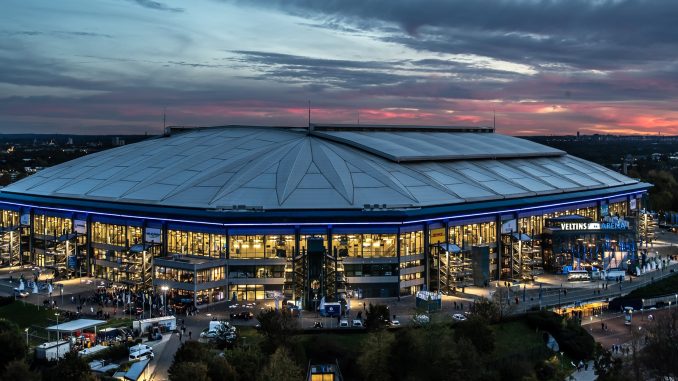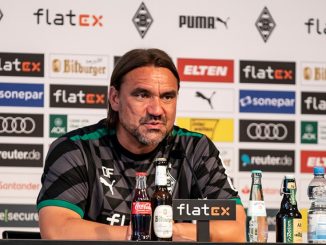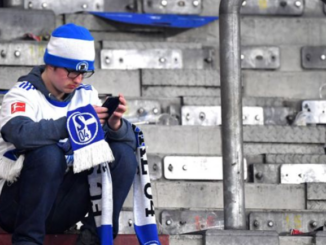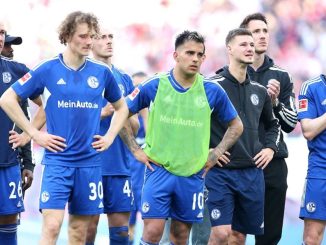
The 2020-21 edition of FC Schalke 04 may have escaped the tag of the Bundesliga’s worst-ever team, but their demise represents a tale of sadness for one of Germany’s oldest clubs.
For a team notorious across Europe for producing truly world-class talents and one playing European knockout football as recently as 2019, Schalke have been crushed by a financial mismanagement, lack of investment, and outright dreadful performances on the pitch. As the Bundesliga 2 beckons, it’s easy to forget it hasn’t always been this bad for Schalke 04.
Trudging off the Old Trafford pitch after Schalke’s 2011 Champions League semi-final defeat against Manchester United, the result was dismal but the future looked bright for the royal-blues. Captained by Manuel Neuer and with Raul, at-the-time top-goal scorer in European football, in attack, a valiant blend of youthful prodigies and experienced professionals went down 6-1 across two legs to the competition’s eventual runners-up and Premier League champion.
For Schalke, the misery of that crashing-out was short-lived as the club travelled to Berlin two weeks later and returned with hardware, thanks to a 5-0 victory against second-tier MSV Duisburg in the DFB Pokal final.
Among the goal-scorers that day was a young Julian Draxler. Born in the town of Gladbeck, Draxler spent his childhood in the shadow of the VELTINS-Arena, joining the club as an eight-year-old and accumulating 119 appearances. Draxler would later become a World Cup winner and captain of Germany’s successful 2017 Confederations Cup side. The dynamic midfielder represented everything Schalke have stood for since their formation in 1904.
Dubbed die Knappen, an old German term for miners referencing the sheer number of players they drew from the coal mines of Gelsenkirchen. Despite their humble origins, Schalke were considered one of Germany’s original wonder-sides. Dominating football in the Westphalia region well before the introduction of fierce rivals Borussia Dortmund, Schalke went on an impeccable home unbeaten run that stretched across eleven seasons between 1933 and 1944, notching-up six national championships. The club’s ‘spinning top’ style of play was revolutionary. Having built on early tactics deployed by Scottish teams, a side of footballing pioneers introduced concepts of one-touch passing and utilising unused space on a pitch, a change to the traditional heavy handed ‘kick and run’ favoured by most coaches at the time. Early stars of the game like Fritz Thelen, Ernst Reckmann, ex-Germany captain Fritz Szepan, and one of the club’s greatest strikers of all time, Ernst Kuzorra, placed Schalke 04 on the emerging map of European football’s super teams.
After a post-war wobble derailed the club for a while, Schalke regained superiority in the 1950s, once again being crowned champions of Germany at the end of the decade, defeating Hamburger SV 3-0 in the final.
Schalke 04 have displayed a consistent ability to produce footballers – be that Draxler or Kuzorra – who are capable of performing at the highest level, captaining die Mannschaft, and bringing trophies back to Gelsenkirchen, making the club’s turmoil in the last decade a much harder pill to swallow for the 155,000 royal-blue members. Throughout each period of success for Schalke, their identity and working class connections have stayed true. Whilst the players, managers and stadiums may have changed, the ethos of community has remained, but without a league title since 1958 and no silverware since the 2011 Pokal victory, what was once a proud history has been ripped apart by a decade of austerity, questionable boardroom decisions, and a managerial carousel, culminating in an almost historic 30-game winless run.
Stubbornness at the top of Schalke’s hierarchy has seen talents developed through the academy leave for next to nothing, or in the case of Alexander Nübel, for nothing. Handed the captaincy at the start of the 2019-20 season with just one year left on his deal, Nübel agreed to an end-of-contract move to Bayern during the winter break, a move that triggered an earthquake of discontent within the Schalke ranks. Dropped within the midst of the club’s worst-ever winless streak, never to play for the club again, Nübel was just another name on the list of prodigies that have walked away from the VELTINS-Arena with little but a tarnished reputation to show for it.
The Nübel standoff did little to repair an already fractious relationship between Germany’s second-largest fan base and the board. Having once been revered for their ties to its working-class communities, a string of controversies, including a partnership with Russian energy giants Gazprom and a series of private investments, has seen the gap between supporters and board grow significantly.
When Schalke finally tasted victory once more there was a certain irony that it was yet another young starlet, 19-year-old David Hoppe, who provided the smallest rays of hope for a side that hadn’t won in over a year with a 4-0 win against Hoffenheim.
Germany is no stranger to a big club falling into trouble. European Cup and six-time champions of Germany, Hamburger SV have plied their trade in the 2. Bundesliga since their relegation in 2018, with fans of die Rothosen all too aware of the difficulties second-tier football provides.
If Schalke are to suffer their first relegation in over 30 years at the end of this campaign, who knows when or if they’ll return to the top flight. The Covid-19 pandemic has only accentuated existing financial problems, with Schalke 04 needing to strike gold if the old miners club are to retain their position as one of Germany’s oldest and biggest teams.




When Nübel left there were already standing issues for a while, I hardly think he is worthy of mention… many more before him. And who is David Hoppe? Really? You mean Matthew Hoppe!